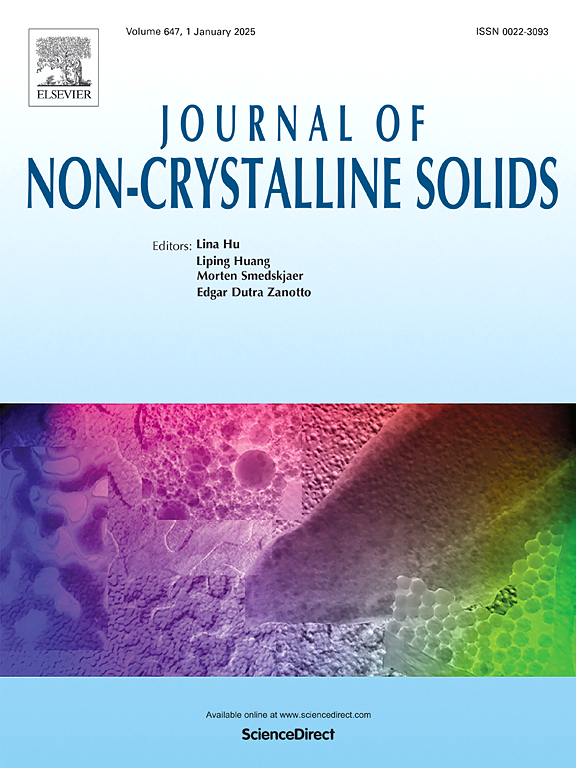闪烁-DSC 为玻璃弛豫和结晶提供了宝贵的见解
IF 3.2
3区 材料科学
Q1 MATERIALS SCIENCE, CERAMICS
引用次数: 0
摘要
传统的差示扫描量热仪(DSC)被广泛用于研究玻璃的热反应,如结晶、弛豫和玻璃转化。然而,它们的冷却(qc)和加热(qh)速率有限,通常在 0.01 至 2 K s-1 之间。闪烁-DSC 克服了这一限制,实现了更高的速率(高达 ∼104 K s-1),允许探索更宽的实验时间范围,这对于研究与熔体和玻璃工业相关的玻璃化转变现象非常有价值。在本研究中,我们利用闪烁-DSC 来研究二硅酸锂(Li2Si2O5)和偏硅酸铅(PbSiO3)玻璃的热行为。我们测量了它们的极限虚构温度 (T'f)、起始玻璃化转变温度 (Tg,onset) 以及可从 DSC 实验中获取粘度的偏移因子。我们的研究结果表明i) 移位因子与成分有关;ii) 当对不同冷却速率和 qh>qc 绝对值的玻璃样品使用固定加热速率时,Tg,onset 会随着 qc 的减小而向更高值移动,但当 qh≤qc 时,尽管由于加热路径上的弛豫而导致 T'f 值不同,Tg,onset 却没有明显变化;iii) Li2Si2O5 玻璃在以最低速率(50 K s-1)冷却后,在 8 次重复实验中显示出不重叠的加热曲线,表明在冷却过程中部分结晶,而 PbSiO3 显示出重叠的加热曲线,表明其玻璃形成能力更强。因此,估计 Li2Si2O5 玻璃化的临界冷却速率高于 50 K s-1。这些发现表明闪烁-DSC 能够为弛豫和结晶现象提供有价值的见解。本文章由计算机程序翻译,如有差异,请以英文原文为准。
Flash-DSC provides valuable insights into glass relaxation and crystallization
Conventional differential scanning calorimeters (DSC) are widely used to study thermal responses in glasses, such as crystallization, relaxation, and glass transition. However, their cooling () and heating () rates are limited, typically ranging from 0.01 to 2 K s−1. Flash-DSC overcomes this limitation by achieving much higher rates (up to ∼104 K s−1), allowing exploration of a wider range of experimental times, which is valuable for studying the glass transition phenomenon relevant to melts and glass industry. In this study, we utilized flash-DSC to investigate the thermal behavior of lithium disilicate (Li2Si2O5) and lead metasilicate (PbSiO3) glasses, employed here as examples of distinct fragility and glass-forming ability. We measured their limiting fictive temperatures (T’f), onset glass transition temperatures (Tg,onset), and the shift factors, which enable the retrieval of viscosity from DSC experiments. Our findings reveal that: i) the shift factor is composition-dependent; ii) when using a fixed heating rate for glass samples made with different cooling rates and the absolute values of , Tg,onset shifts to higher values as decreases, but when , Tg,onset shows no significant variation despite different T’f values due to relaxation on the heating path; iii) Li2Si2O5 glass exhibited non-overlapping heating curves in 8 repeated experiments after being cooled at the lowest rate, 50 K s−1, suggesting partial crystallization during cooling, while PbSiO3 exhibited overlapping heating curves, indicating its superior glass forming ability. Therefore, the critical cooling rate for vitrification of Li2Si2O5 was estimated to be above 50 K s−1. These findings indicate the power of flash-DSC to provide valuable insights into relaxation and crystallization phenomena.
求助全文
通过发布文献求助,成功后即可免费获取论文全文。
去求助
来源期刊

Journal of Non-crystalline Solids
工程技术-材料科学:硅酸盐
CiteScore
6.50
自引率
11.40%
发文量
576
审稿时长
35 days
期刊介绍:
The Journal of Non-Crystalline Solids publishes review articles, research papers, and Letters to the Editor on amorphous and glassy materials, including inorganic, organic, polymeric, hybrid and metallic systems. Papers on partially glassy materials, such as glass-ceramics and glass-matrix composites, and papers involving the liquid state are also included in so far as the properties of the liquid are relevant for the formation of the solid.
In all cases the papers must demonstrate both novelty and importance to the field, by way of significant advances in understanding or application of non-crystalline solids; in the case of Letters, a compelling case must also be made for expedited handling.
 求助内容:
求助内容: 应助结果提醒方式:
应助结果提醒方式:


